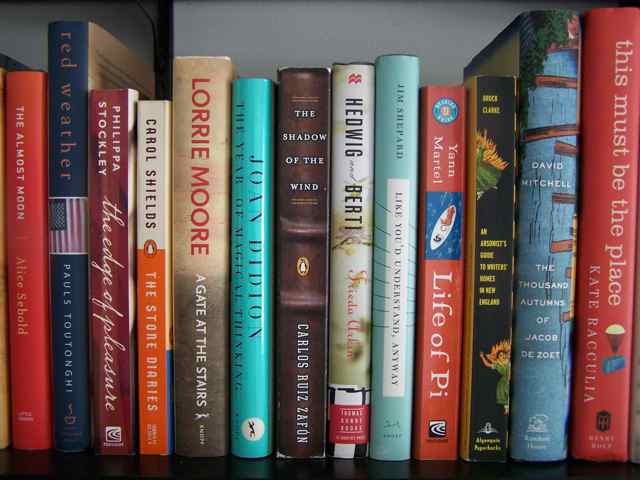 Escaping separate life crises, Lillian, Stephen, and Rachel coincidentally return at the same time to the haven of their childhood years — Mom and Dad’s house — for what turn out to be extended visits in The Arrivals, a first novel by Meg Mitchell Moore. Add in Lillian’s young daughter and baby son and Stephen’s pregnant wife Jane, chafing at being away from her job, and Ginny and William Owen’s house in Burlington, Vermont, is quickly overstuffed with dependents and their clutter.
Escaping separate life crises, Lillian, Stephen, and Rachel coincidentally return at the same time to the haven of their childhood years — Mom and Dad’s house — for what turn out to be extended visits in The Arrivals, a first novel by Meg Mitchell Moore. Add in Lillian’s young daughter and baby son and Stephen’s pregnant wife Jane, chafing at being away from her job, and Ginny and William Owen’s house in Burlington, Vermont, is quickly overstuffed with dependents and their clutter.
It takes longer than you might think for brusque, efficient Ginny and the easygoing William to get over the pleasure of feeling needed again and start wondering when their kids are ever going to leave and take their hormones, anxieties, and children with them.
The tension of keeping their personal feelings and problems secret builds up slowly over the course of the summer the family is unintentionally spending together. Lives have been shaken up, for better or worse, but everyone emerges at the end, a little battered but stronger.
This is a very pleasant read for the cottage or in the back yard this summer. Recommended for reader (especially mothers and grandmothers) who enjoy women’s fiction authors like Elizabeth Berg and Claire Cook.
 The Weird Sisters by Eleanor Brown also has three adult children returning to their childhood home in a college town who don’t want to explain why they’ve moved back. Ostensibly, they’re home to care for their mother who has been diagnosed with breast cancer, but her illness is an excuse, not a reason. For Bianca and Cordelia, the two younger sisters, life hasn’t worked out the way their overly bookish, youthful selves had vaguely imagined. For Rosalind, the oldest and outwardly successful sister, life has stayed on a predictable path for so long, she’s stymied by a future that looks different from how she had imagined.
The Weird Sisters by Eleanor Brown also has three adult children returning to their childhood home in a college town who don’t want to explain why they’ve moved back. Ostensibly, they’re home to care for their mother who has been diagnosed with breast cancer, but her illness is an excuse, not a reason. For Bianca and Cordelia, the two younger sisters, life hasn’t worked out the way their overly bookish, youthful selves had vaguely imagined. For Rosalind, the oldest and outwardly successful sister, life has stayed on a predictable path for so long, she’s stymied by a future that looks different from how she had imagined.
Over the course of the story, the three sisters come to accept that, despite their self-given nickname (“the weird sisters” after the witches in Macbeth) they are normal, rather than exceptional. This belated coming of age story about three sisters who, in their thirties, have made no difficult decisions yet, might be best for forgiving readers in their twenties and thirties. Older readers may get annoyed by the immaturity of the sisters AND their parents. Their father, a professor in the prestigious, local college, is a big fish in a small pond who hides from the messiness of real life behind a wall of Shakespearean quotations. (Really! He says almost nothing in the book that is not a direct quote from a play or sonnet.) their mother doesn’t emerge much from the background, since the book is from the point of view of the “adult” children, but the three sisters see her mostly as a distracted maternal presence who relied on Rosalind to mother the younger two.
Kirsten Potter narrated the audio version of The Weird Sisters very well, although the unusual, first-person plural voice of the book took a little getting used to. Rosalind (“Rose”), Bianca (“Bean”), and Cordelia (“Cordy”) are only “we” in the story, although the reader hears individual thoughts and feelings, it’s as if it’s observed by all three at the same time. The first-person plural voice seems to signify that not only are they not so different from everyone else as they had hoped, but also not as different from one other, which is not a bad thing.
The Weird Sisters also reviewed recently by:
Bibliophile by the Sea
You’ve Gotta Read This
